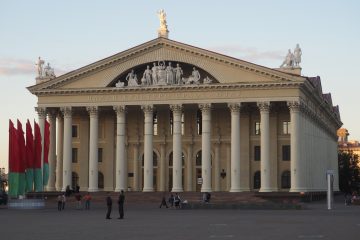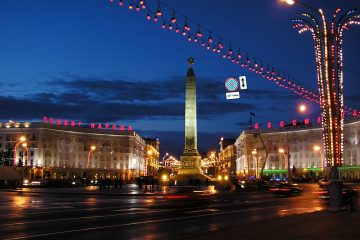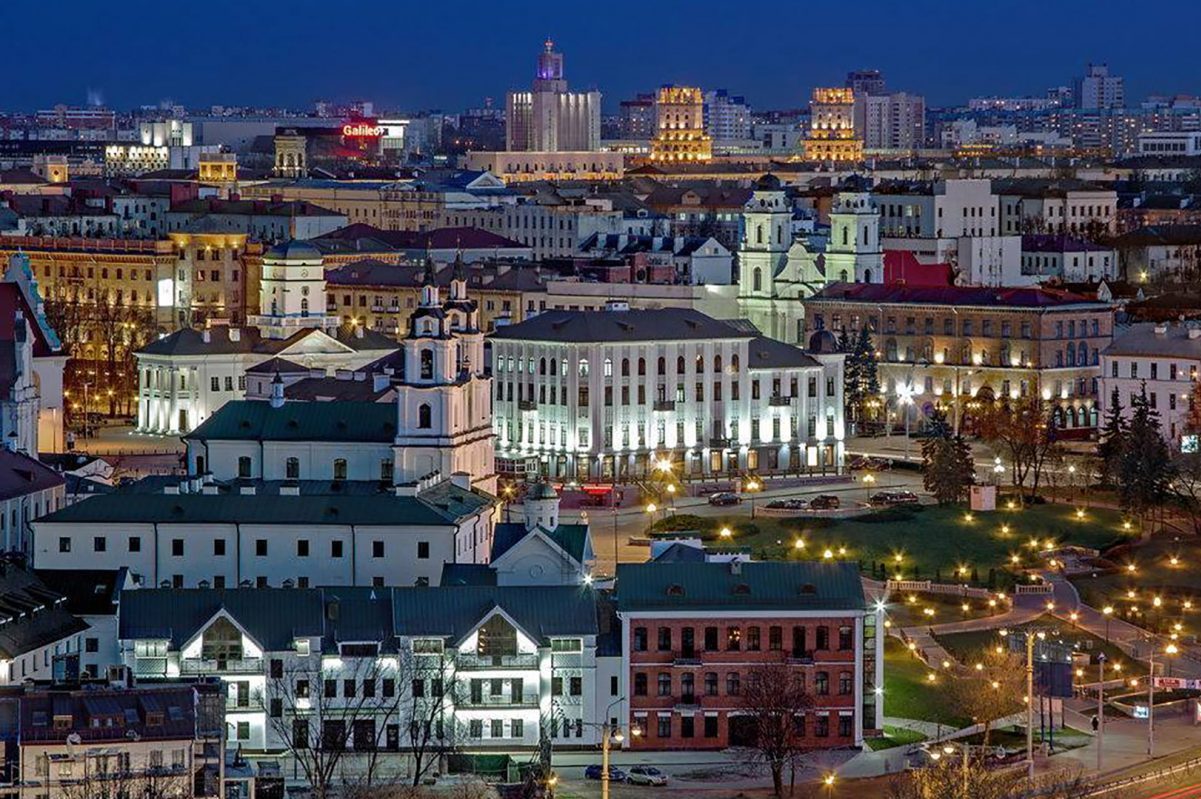Strategy Report 2016/2018
1. The situation in Belarus
Moscow – Minsk tensions
To shore up its precarious strategic situation, the authoritarian Lukashenko regime is pursuing a policy of controlled cooperation with the Russian Federation. Under Vladimir Putin, the Russian Federation seeks to establish a Moscow-steered Eurasian Economic Union; Belarus plays an important role in this. The development of this economic union has been overshadowed by Moscow’s aggressive foreign and military policy, which is accompanied by interventionist nationalist propaganda targeting domestic and international audiences. This has given rise to fears of war and of Russian political infiltration in the post-Soviet countries that share a border with Russia, such as Ukraine, the country primarily effected by this aggressive policy, but also the Baltic states and Belarus. Russian radio and television programming with close ties to the state carries the Russian point of view into the homes of the peoples in neighbouring countries, where many segments of the populations regularly listen to/view such programming. The Belarusian regime is not alone in seeing this as a threat to the country’s independence, and it has the backing of parts of the Belarusian population in its wrangling over compromises with Moscow on economic and financial issues, particularly as Lukashenko has recently been making a point of openly promoting the Belarusian language as a symbol of Belarusian independence. Lukashenko’s refusal to give up the state economy, dictated by his desire to remain in power, means that any attempt on his part to disentangle the country from its economic and financial dependence on Moscow is predestined to fail. By providing logistical support for Europe’s attempts to mediate in the Russian-Ukrainian conflict, the “Minsk Process”, Lukashenko boosted his international status and reputation– notwithstanding persistent criticism of the continued human rights abuses in Belarus from the European Union, the Council of Europe and the USA.
Twenty years of the Lukashenko Constitution in Belarus
In November 2016, the Lukashenko regime celebrated the twentieth anniversary of an unconstitutional revision of the constitution, the adoption of which was also forced through in an unconstitutional manner. In the interests of staying power, the regime is adamant about retaining the state economy in the industrial sector, collective agriculture and state control of trade and commerce. In a bid to prevent the emergence of a self-organising socially and economically relevant force, the regime has imposed strict limits on the economy’s rapidly developing informal sector, which makes a significant contribution towards maintaining an adequate standard of living for Belarusian families.
Continuing human rights abuses
At the rhetorical level, the regime is now opening itself to cooperation with the European Union. The reasons for this turnaround are strategic in nature: the regime hopes to develop options in its efforts to safeguard its independence in the face of Russian pressure and, if possible, to carve out some latitude in the area of economic policy that would enable it to carry out urgently necessary modernisation in the Belarusian industrial sector and expand into new sales markets. Contacts with officials within and outside of the Eastern Partnership are on the rise. There is no sign, though, of substantial reforms aimed at liberalising the country’s political culture or at safeguarding the independent human rights of the individual.
The European Union suspended nearly all of its sanctions against Belarus in February 2016, following the release (in August of 2015) of the last opposition figures who were still behind bars. The only sanctions that remain are those imposed after the forced disappearance of opposition leaders in 1999/2000 and those imposed in 1997, which include the suspension of guest-status for Belarus at the Council of Europe and the freezing of ratification of the cooperation agreement between the EU and Belarus in response to the unconstitutional constitutional coup of 26 November 1996.
With trepidation and disappointment, western countries have had to watch the numbers of death sentences and executions rise since sanctions were lifted. On a more mundane level as well, the regime has been waging a merciless war on protest of any kind – whether in the form of political protest, or economically or socially motivated action by citizens or business people – with administrative penalties (monetary fines).
It must be noted that the suspension of sanctions has not resulted in any easing of the regime’s various wars – on reporting by the independent media or on the assembly of citizens for the purpose of protest or on the public expression of views – wars that are now certainly motivated by concerns about Moscow’s political and indirect attempts to interfere in the formation of political opinions on the part of the populace in the country, as well as by fears about aspirations.
It is apparent that the Western governments are cultivating more intensive relations on and with Belarus – with the aim of bolstering the country in its dealings with Moscow, rather than out of some misguided expectation that the regime itself might evince the slightest indication of a major change in domestic policy.
The elections to the 110-seat National Assembly on 11 September 2016 were conducted as an integral element of “formalised political conditions of the authoritarian presidential system”, without coming even close to meeting the European standards of transparency for vote counting and without allowing any challenge to the dominance of state offices in the election committees. The president’s complete lack of political instincts for or even understanding of the political culture of a democratically structured state manifested itself in the rigged electoral victories of two independent candidates, who now serve alongside 108 of the president’s faithful supporters in the National Assembly and will certainly come under pressure soon.
Those political parties whose platforms are rooted in European values eke out a lamentable existence on the margins of the state managed society.
The same applies for the information sector: only by taking notice of Internet publications can Belarusians develop a relatively comprehensive picture of what is happening in their own country or on the international stage. Tellingly, both the Levada Center and the IISEPS, two institutes known for decades for their independent research on public opinion, had to cease their activities in both Belarus and Russia– an irreplaceable loss for the formation of public opinion in the countries and on the international stage. In the absence of information about the differentiated processes shaping the opinions of people in the authoritarian systems, it will grow ever more difficult for Western countries to gain a picture of the situation in those countries that reflects reality and to gain a sense of the mood of the populations in question. Foreign journalists have already come under pressure in Moscow and in Minsk due to charges of a negative bias against Moscow and Minsk in reporting in Germany.
“Thriving cities” and citizens in need
Despite the country’s economic and financial problems, Minsk and other cities present a picture of what look, from the outside, like affluent societies. The picture is misleading. The state is able to carry through on the benefits it has promised – with respect to housing, education, occupation, health and security in old age – on paper only, no longer in reality. Plugging the gaps in the finances of family households requires great effort on the part of citizens, in the way of autonomous economic activity or by taking employment abroad.
The tax burdens on non-state enterprises have risen again – a development that runs diametrically counter to the state’s announced intention to promote the private sector, and one that will further damage the investment climate.
In the tradition of the Soviet and Russian capacity to endure suffering, the general public is tolerating the restrictions on their rights and economic and civil liberties. When in doubt, the Belarusians pin their hopes on help from Russia: dependency on Russia is a part of lived reality in Belarus, and one that is casts doubt on the preservation of Belarusian independence given the Kremlin party’s new neo-nationalist drive for domination. Historical ties to liberal and open societies are now of no more than marginal relevance in the minds of the country’s citizens. Defamed by the propaganda disseminated by the state-run media, the European model does not strike many as an obvious alternative.
Belarus’ new military doctrine, issued on 20 July 2016, reflects the strategic ambivalence of the situation in which the Lukashenko regime now finds itself. The doctrine emphasises the defensive nature of the country’s armed forces and affirms a commitment to the peaceful resolution of conflicts in a manner analogous to the Western security doctrines. Tellingly, Belarus conducted exercises in the defence against hybrid attacks in 2016 – a reflection of current Russian military doctrine and practice.
The government and the public are aware of Russian media’s various opinion-shaping influences; which may played a role in the incident involving the Russian flag carried by an (unofficial) member of the Belarusian team at the Paralympics in Rio de Janeiro, which, some believe, was intended as a political provocation – to damage Belarus.
2. Recommendations
In view of the threat to Belarus and to the East European region posed by Russian neo-nationalism and the expansionist power politics associated with it, and of the only halting progress of reform processes in the Eastern Partnership countries, the following recommendations for the policy of the EU and its members seem appropriate:
- Priority should be given to supporting the implementation of the association agreements concluded under the Eastern Partnership (Ukraine, Georgia, Moldova).
Strengthening cooperation under the Civil Society Forum Eastern Partnership is of no little significance in this regard – these efforts can result in the formation of issue-oriented networks based on personal contacts that can be highly influential over the long term for the development of the political climate in the Eastern Partnership countries. In brief: the discussion about the society’s shared values will serve as not only as a foundation for the democratic order in these countries, but also as a foundation for socio-economic conditions within the economy that can initiate and foster a market economy that is well anchored in society. - Strengthening the external programming of Western information systems in the region’s languages – this is needed to counter the Russian-managed propaganda from Moscow intended to influence opinions.
- Strengthening multilateral cultural and youth exchanges.
- Promotion of initial and continuing education and training of generations currently in or entering training and of young persons at the start of their professional careers.
- Creation of “forums for the future” for and in these countries. Possible topics: internal and external security; migration and integration, dual vocational education and training, social market economy, development and reform in the European institutions).
- Advising and formation of an opinion concerning the EHU.
In November, experts undertook a critical review of progress made since Belarusian institutions of higher education were admitted, on a trial basis, to the Bologna Process in 2015: the review clearly showed that the government has been unwilling – due to the fear of losing control of the sphere of academic teaching and research – to make any concessions at all in connection with realising the framework conditions for the Bologna Process. The trial period will expire in 2018. Freedom of academic teaching and research is a prerequisite for admission to the Bologna Process. No such freedom exists in Belarus at this time.
There are therefore multiple grounds for desiring the EHU – the exiled independent European Humanities University (Vilnius) – to serve as a model for the respect for academic freedom in its departments and institutes. However more than a few experts have expressed serious doubts as to whether it can do so. The European Union, the most important source of EHU funding, must thoroughly investigate these uncertainties. Financial auditing, while in itself essential, is not sufficient to ensure the prioritisation of and respect for European values in research and teaching activities or in the university’s administration.
Berlin, November 2016
Dr. Hans-Georg Wieck, Former Ambassador, Chair
Stefanie Schiffer, Deputy Chair
Christoph Becker, Treasurer
Stephan Malerius, Advisory Member


